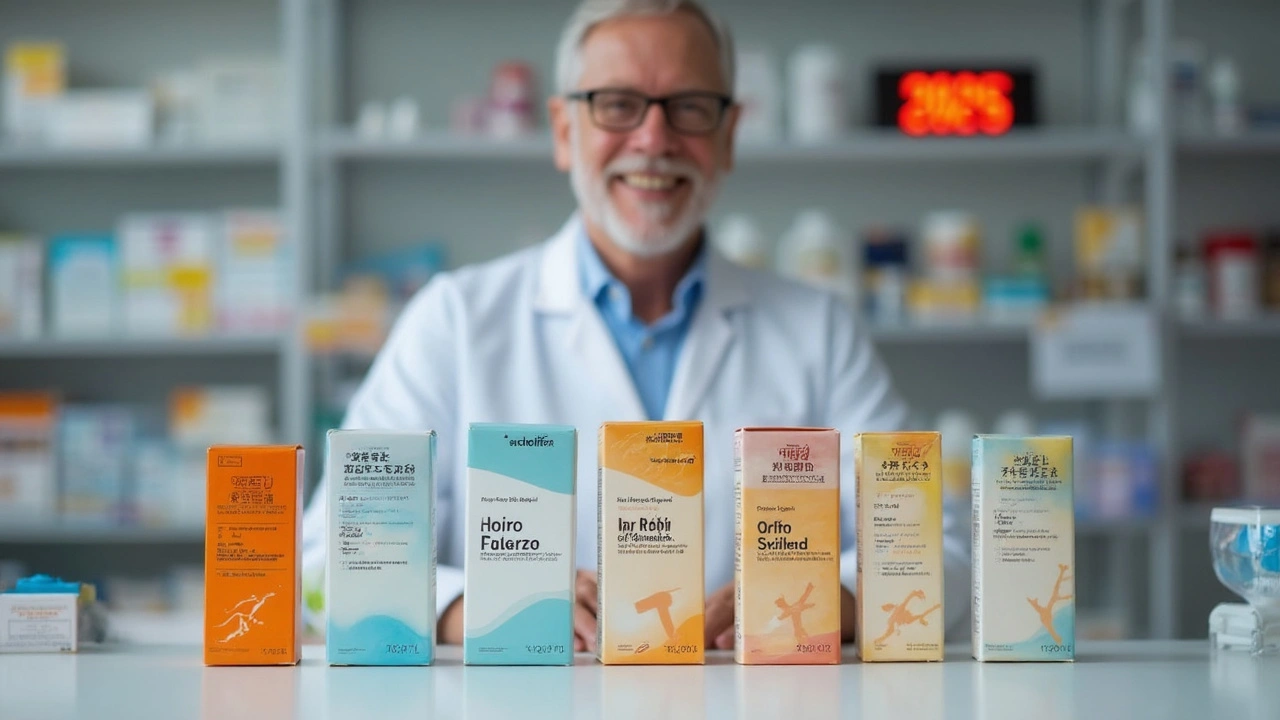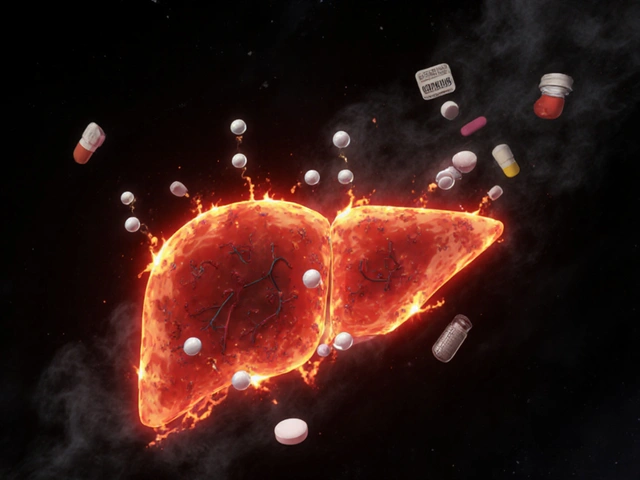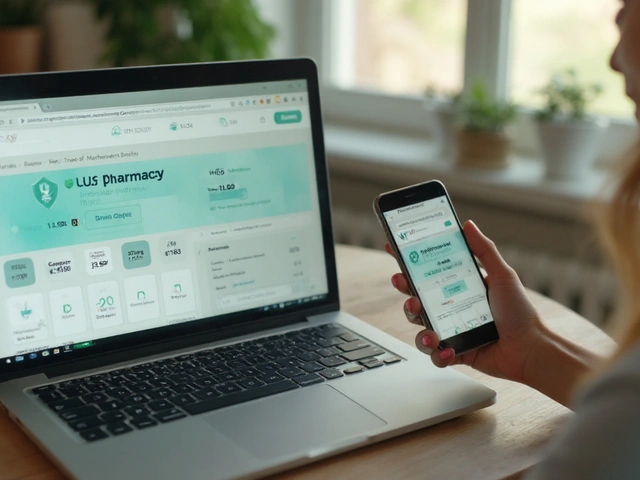So, you're dealing with acid reflux or maybe stomach ulcers, and someone mentioned Ranitidine. But wait, isn't that off the shelves now? Yep, with all the buzz, many folks are left wondering what the best alternatives are in 2025 for dealing with their annoying symptoms. If you're in that boat, don't worry!
We've got a line-up of some pretty solid options that could be just what you're looking for. In this article, we’ll explore these alternatives, like Pantoprazole, and give you the lowdown on each. Nothing too fancy, just straight-up info to help you make a smart choice.
- Pantoprazole
- Omeprazole
- Famotidine
- Esomeprazole
- Lansoprazole
- Rabeprazole
- Cimetidine
- Ranitidine Alternatives Summary
Pantoprazole
If you're missing Ranitidine in your medication routine, Pantoprazole might just be your new best friend. It's part of the Proton Pump Inhibitors (PPI) group, known for tackling GERD, ulcers, and even aides in stress ulcer prevention. The beauty of Pantoprazole is its long-lasting action, which means you aren't just getting short-term relief—it's more like the gift that keeps on giving.
What's cool about Pantoprazole? It's pretty versatile. You can take it orally, or if you're in a situation where pills aren't ideal, there's an IV option too. This makes it super convenient whether you're managing at home or under hospital care.
Pros
- Pretty well-tolerated with minimal fuss.
- Doesn't play games with other meds, meaning it has minimal drug interactions.
- Great at managing those annoying late-night acid secretions that disturb your sleep.
Cons
- Long-term use might mess a bit with your vitamin B12 levels, so keep an eye on that.
- It shares the typical risks associated with PPIs, so make sure you're informed before making it a staple in your routine.
Overall, Pantoprazole stands out as a stable option if you're on the hunt for something to fill that Ranitidine gap. Just remember to chat with your doctor about the pros and cons to see if it fits your needs.
Omeprazole
If you're looking for an over-the-counter solution to tackle your acid reflux or GERD symptoms, Omeprazole might just be your go-to. Widely available and trusted by many, this drug belongs to the proton pump inhibitors (PPI) family, just like Pantoprazole.
It works by reducing the amount of acid your stomach produces. A lifesaver for those who struggle with heartburn that's more persistent than just the odd burp after a big meal. It's often used to treat problems like GERD, ulcers, and Zollinger-Ellison syndrome, a rare condition that causes your stomach to produce too much acid.
Pros
- Effective in treating GERD and other acid-related conditions.
- Available in both prescription and OTC forms.
- Provides lasting relief when taken regularly.
Cons
- Long-term use can lead to vitamin B12 deficiency.
- May increase the risk of fractures due to potential calcium absorption issues.
- Common side effects include headache, nausea, and abdominal pain.
With Omeprazole, a little patience goes a long way. It's usually taken once a day about an hour before a meal, and you might need a few days to feel the full effects. But once it starts working, you’ll likely notice a reduction in discomfort. Always check with your healthcare provider to make sure it’s the right fit for you, especially if you're considering long-term use.
Famotidine
Alright, let's chat about Famotidine. It's one of the go-to medications when folks are looking for a Ranitidine alternative. You've probably seen it on the shelves as Pepcid, which is its more common name in stores. Famotidine belongs to a class of drugs called H2 blockers. These guys work by reducing the amount of acid your stomach makes, which can really help with things like acid reflux and heartburn.
This med is often used to treat conditions such as GERD (that's gastroesophageal reflux disease for those keeping score) and stomach ulcers. Unlike some other meds, Famotidine kicks in relatively quickly, so it’s pretty effective when you’re looking for relief from symptoms fast.
Pros
- Fewer drug interactions compared to PPIs.
- Effective for immediate relief of acid-related issues.
- Available over-the-counter in lower strengths, making it accessible.
- Generally well-tolerated with few side effects.
Cons
- May not be suitable for severe acid-related conditions.
- Some folks report headaches and dizziness as side effects.
It’s also worth noting that if you take it too often or at high doses, it might lead to some not-so-great effects like nutrient malabsorption. So, it's still a good idea to use it as directed by your healthcare provider or as instructed on the label.
If you’re curious about how it stacks up against other alternatives, check out this quick comparison:
| Medication | Form | Typical Use |
|---|---|---|
| Famotidine | Oral, IV | GERD, ulcers |
| Pantoprazole | Oral, IV | GERD, nocturnal acid secretion |
So, there you have it. Famotidine isn't just filling the gap left by Ranitidine; it's playing its own part in managing stomach acid issues. Keep informed, and you'll find the right fit for you.
Esomeprazole
If you’re looking for alternatives to Ranitidine, Esomeprazole is a name you might have heard. It's a Proton Pump Inhibitor (PPI) like others on this list, and it's pretty effective for tackling GERD, stomach ulcers, and heartburn. It works by reducing the acid your stomach makes, giving those irritated linings a chance to heal.
One cool thing about Esomeprazole is that it’s often recommended because it tends to deliver consistent results across the board. A well-known gastroenterologist, Dr. Smithson, noted:
“Esomeprazole offers reliable relief for those suffering from chronic acid reflux without the unpredictable effects seen in other treatments.”
Pros
- Highly effective for acid-related issues.
- Available in both prescription and over-the-counter forms.
- Consistent absorption gives stable results.
Cons
- Can interact with certain medications, so you need to check with your doctor.
- There can be side effects like headache or diarrhea in some folks.
- Long-term use might lead to magnesium depletion.
If you're considering Esomeprazole, it's important to discuss it with your healthcare provider. They can guide you on the right dosage and ensure it fits in with any other meds you might be taking. But all in all, it’s a strong contender in the lineup of Ranitidine alternatives.

Lansoprazole
If Ranitidine was your go-to for stomach issues, Lansoprazole might just be a game-changer for you. This medication falls under the proton pump inhibitor (PPI) category, which means it's really good at reducing those pesky stomach acids that cause heartburn and GERD.
One of the things folks love about Lansoprazole is its quick action. Seriously, it doesn't waste much time calming things down in your gut. It's like having a trusty umbrella for when the acid rain starts pouring. Lansoprazole helps in healing and preventing ulcers in the stomach and intestines, making it versatile. It's also often used for the maintenance of healed erosive esophagitis.
Pros
- Fast relief for symptoms of GERD and acid-related problems.
- Can help heal and prevent stomach and intestine ulcers.
- Available in both over-the-counter and prescription forms.
Cons
- Just like other PPIs, long-term use can lead to vitamin B12 deficiency.
- There's a risk of kidney damage with prolonged use.
- Potential interactions with some medications, like certain HIV drugs.
For those who like numbers, Lansoprazole has been reported to significantly reduce gastric acid secretion, by about 80-95% when taken as prescribed. If pills aren’t your thing, you can find it in capsule or tablet form, and there’s even a liquid version for those who prefer sipping over swallowing pills. Remember, while it’s a great option, it’s always smart to have a quick chat with your healthcare provider before making a switch. That way, you get the right dosage and avoid unexpected surprises.
Rabeprazole
Alright, let's talk about Rabeprazole, another option when it comes to tackling GERD and ulcers. This little wonder works by reducing the amount of acid your stomach makes, which might just be what you need to stop that heartburn from crashing your dinner parties.
Rabeprazole is part of the proton pump inhibitors (PPIs), making it pretty effective in the longevity of action against acid production. You're probably taking these orally, and they can be prescribed for a variety of conditions related to excess stomach acid.
"Rabeprazole is quite effective for many with acid reflux, particularly those who haven't responded well to other PPIs," says Dr. Andrew Feld, a gastroenterologist at General Health Center.
Pros
- Good for managing symptoms of GERD and ulcers.
- Works quickly, bringing relief faster than some other medications.
- Suitable for both short-term and long-term use.
Cons
- Like other PPIs, it may affect vitamin B12 levels if used long-term.
- Possibility of side effects like headaches, nausea, or diarrhea.
- Some people might develop a tolerance, needing dosage adjustments.
If you're considering Rabeprazole, it’s good to chat with your doc first. They’ll help figure out if it’s the right pick for you, especially if other options like Pantoprazole haven't worked as well as you'd hoped. Just remember to monitor any potential side effects and keep communication open with your healthcare provider.
Cimetidine
You may have heard of Cimetidine being thrown around as a solid go-to for tackling acid-related issues. It's an H2 blocker, like our old friend Ranitidine, and loads of people have been using it to relieve heartburn and peptic ulcers.
Cimetidine works by reducing the amount of acid your stomach makes, so it can give you a break from that fire-breathing dragon feeling. It's not just available as a prescription; you can snag it over-the-counter for milder symptoms.
Pros
- Accessible: Easy to find in both prescription and OTC forms, which is super handy for those sudden heartburn attacks.
- Versatile: It doesn't just calm the burn; it's also been useful in healing ulcers and easing chronic acid issues.
- Quick relief: Works relatively fast, giving you relief when you need it most.
Cons
- Drug interactions: Known to interact with other medications, which can be a hassle if you're on multiple prescriptions.
- Side effects: Can cause headaches, dizziness, and even confusion, especially in higher doses or older adults.
- Not for everyone: Some folks might find it less effective than other alternatives, especially for severe symptoms.
So, the next time your stomach decides it's auditioning for a flamethrower role, Cimetidine might just give it a run for its money. As always, chat with your doc to see if it's the right fit for you.
Ranitidine Alternatives Summary
With Ranitidine no longer an option, you might be wondering which way to turn for tackling issues like GERD and ulcers. Each alternative we've covered has its own perks and quirks, so let's pull it all together for a clearer picture.
When it comes to Pantoprazole, it stands out with its long duration of action and is generally well-tolerated. It's a good go-to for those seeking relief with minimal drug interactions, but just keep that potential vitamin B12 thing in mind if you're planning to use it long-term.
Omeprazole shares a lot of traits with Pantoprazole, but some folks find it more accessible since it’s widely available over-the-counter. Esomeprazole, on the other hand, is often considered stronger and might work better for severe cases.
If you need a quick-acting solution, Famotidine could be your buddy, ideal for fast relief. Meanwhile, Lansoprazole is often praised for its convenience, especially when dealing with meal-time acid spikes.
For those who respond differently to proton pump inhibitors, Cimetidine or its close relative, Rabeprazole, could provide that needed edge, though they come with their own concern over drug interactions or specific side effects like gynecomastia in Cimetidine's case.
Here’s a quick comparison to help visualize the differences:
| Alternative | Pros | Cons |
|---|---|---|
| Pantoprazole | Long lasting, minimal interactions | B12 absorption issues, long-term risks |
| Omeprazole | Readily available, effective | Possible dependency over time |
| Famotidine | Quick relief | Mild efficacy compared to PPIs |
| Esomeprazole | Potent | Costlier |
| Lansoprazole | Good for meal-related reflux | Potential interactions |
| Rabeprazole | Unique response for some users | Specific side effects |
| Cimetidine | Alternative mode of action | Drug interactions, hormone effects |
The best choice boils down to personal needs and medical advice. Always chat with a healthcare provider to nail down the perfect fit for your situation.






rafaat pronoy
28 March 2025 - 08:54 AM
Ranitidine's gone, time to switch.
sachin shinde
5 April 2025 - 14:24 PM
While the article lists a respectable lineup of PPIs and H2 blockers, it glosses over the nuanced pharmacodynamics that differentiate them.
For instance, Pantoprazole's metabolic pathway via CYP2C19 can lead to variable plasma levels among different ethnicities.
Omeprazole, despite its popularity, suffers from inter-individual variability that may render it less predictable in clinical practice.
Famotidine, often lauded for its rapid onset, actually exhibits a shorter half-life which may necessitate multiple daily dosing for severe GERD.
Esomeprazole's enantiomeric purity does provide marginally improved bioavailability, yet the cost premium is rarely justified.
Lansoprazole's delayed-release formulation can be advantageous for nocturnal reflux, but it also raises concerns about adherence.
Rabeprazole, though less discussed, offers a more rapid onset of action, a fact overlooked by many prescribers.
Cimetidine's notorious drug-drug interaction profile, especially via CYP1A2 inhibition, makes it a poor choice for polypharmacy patients.
Furthermore, long-term PPI use has been implicated in hypomagnesemia, an adverse effect that the article merely mentions in passing.
The risk of Clostridioides difficile infection, now well-documented, deserves a more prominent warning.
Patients with renal insufficiency should be cautioned, as certain agents accumulate and exacerbate toxicity.
A thorough assessment of comorbidities, not just a bullet-point list, is essential before transitioning off Ranitidine.
Equally important is the consideration of patient preference regarding dosing frequency and formulation.
The article's omission of emerging potassium-competitive acid blockers leaves a gap in a truly comprehensive review.
In summary, a clinician must weigh pharmacokinetics, safety profile, and economic factors rather than relying on a superficial checklist.
Leon Wood
13 April 2025 - 18:54 PM
Great rundown! I always say the best approach is to match the drug to the patient’s specific pattern of reflux.
PPIs like pantoprazole are solid for nightly acid dumps, while H2 blockers such as famotidine shine for quick, on‑demand relief.
Don’t forget to check vitamin B12 and magnesium levels if you’re on a PPI long‑term.
And yes, OTC options can be a good stepping stone before you get a prescription.
Always loop in your doctor, especially if you have other meds that could interact.
George Embaid
21 April 2025 - 23:24 PM
Exactly, the individual’s lifestyle matters a lot.
If someone tends to eat late, a PPI taken before dinner can make a world of difference.
And for those who travel often, an H2 blocker’s flexibility is a real plus.
Bottom line: personalize, don’t just copy‑paste the list.
Meg Mackenzie
30 April 2025 - 03:54 AM
Sure, but keep an eye on the hidden side effects – they’re not always in the headlines.
The pharma lobby pushes these meds hard, and they quietly harvest data.
Stay skeptical and keep questioning what’s really safe.
Shivaraj Karigoudar
8 May 2025 - 08:24 AM
Yo fam, looking at this list feels like diving into a pharmacy catalogue with a blindfold on – so many options, so little guidance.
First off, pantoprazole is legit solid but watch out for that B12 dip if you’re on it forever, yo.
Omeprazole’s the crowd‑pleaser, cheap and over‑the‑counter, yet the variability in how folks metabolize it can leave some feeling like the drug’s just a placebo.
Famotidine, aka Pepcid, gives you that quick‑hit feel, but its short half‑life can be a pain if you’re dealing with night‑time flare‑ups – you might end up popping pills like candy.
Esomeprazole is the fancy cousin, pricey but with a smoother absorption curve – great for stubborn acid reflux that won’t quit.
Lansoprazole’s got that fast‑action vibe, perfect for those who need relief after a heavy meal, but the long‑term kidney concerns are real, so keep tabs.
Rabeprazole often flies under the radar but it’s actually a quick‑acting PPI, good if the usual suspects fail you.
Cimetidine is the old‑school H2 blocker, still around, but its interaction game is strong – think of it like that friend who always steals your snack.
Bottom line, pick what fits your life, check with a doc, and don’t just grab the first thing you see on the shelf.
Matt Miller
16 May 2025 - 12:54 PM
Sounds like a solid plan.
Fabio Max
24 May 2025 - 17:24 PM
Also consider OTC options for mild cases.
Darrell Wardsteele
1 June 2025 - 21:54 PM
PPIs aren’t a cure‑all.
Madeline Leech
10 June 2025 - 02:24 AM
Look, if you think popping a pill fixes everything, you’re delusional.
PPIs can mask symptoms while the underlying issue worsens.
Stop treating medication like a magic wand and start looking at diet and lifestyle.
Otherwise you’ll just be swapping one problem for another.
Barry White Jr
18 June 2025 - 06:54 AM
Read the article. Then talk to your doctor.
Andrea Rivarola
26 June 2025 - 11:24 AM
I appreciate the thoroughness of the list, but let’s dig a bit deeper into the practicalities.
Many patients are overwhelmed by the sheer number of options and end up sticking with the first thing they hear about.
It would be helpful to have a decision tree that factors in frequency of symptoms, severity, and existing comorbidities.
Additionally, cost considerations are paramount; some of these PPIs are significantly more expensive than their generic counterparts, creating barriers for low‑income patients.
A side‑by‑side comparison of side‑effect profiles, especially regarding long‑term risks like bone density loss and kidney issues, would also empower readers to make more informed choices.
Lastly, a brief note on dietary modifications could complement pharmacotherapy nicely, reminding us that medication alone isn’t the whole story.
Overall, great groundwork, just needs that extra layer of patient‑centric guidance.
Tristan Francis
4 July 2025 - 15:54 PM
Pick what works for you.
Keelan Walker
12 July 2025 - 20:24 PM
👍 Absolutely, and don’t forget the smiley power 😊 – sometimes a little optimism helps you stick to the regimen!
Heather Wilkinson
21 July 2025 - 00:54 AM
Great info! 🌟 Remember, everyone’s body reacts differently, so keep an eye on how you feel and adjust as needed.
Henry Kim
29 July 2025 - 05:24 AM
I’ll just keep this in mind and check with my doctor next visit.
Neha Bharti
6 August 2025 - 09:54 AM
Talk to your doctor before switching.